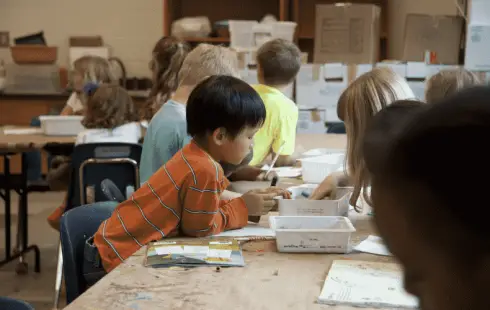Tohru in der Schreiberei, Munich's newest three-Michelin-star restaurant
Section: Arts
 After about six and a half weeks of summer vacation, the new school year starts this Monday in Berlin and Brandenburg. Once again, it will not be a normal one: Because the Corona pandemic is not yet over, schools also have to save energy, and more and more students from Ukrainian refugee families are hitting the classroom.
After about six and a half weeks of summer vacation, the new school year starts this Monday in Berlin and Brandenburg. Once again, it will not be a normal one: Because the Corona pandemic is not yet over, schools also have to save energy, and more and more students from Ukrainian refugee families are hitting the classroom.
In the new school year, more students are learning in Berlin's schools than ever before. According to the education administration, the number of students in general education schools has risen by more than 6,800 to 383,290 compared to the previous school year.
Not all of them will start on Monday: Berlin's first graders will not start school until next Saturday, August 27, and their lessons will then begin on August 29. 37,050 children are registered at the schools, 1370 more than a year ago. According to the education administration, this is the highest number since 2005.
As in previous years, the nationwide shortage of skilled workers is once again having an impact on Berlin's schools. According to the education administration, the need for recruitment was 2645 permanent full-time positions, but not all of them have been filled so far.
Education Senator Astrid-Sabine Busse (SPD) put the gap in unfilled positions a few days ago at 875 - out of a total of more than 34,000 teachers. Many of the newly hired teachers are lateral entrants without a teaching degree.
In view of the continuing shortage of teachers, SPD education expert Marcel Hopp called for cuts to the so-called "hourly table", which determines how many hours are taught in which subject. The return to tenure in Berlin will have a positive effect, Hopp told the Deutsche Presse-Agentur. But the shortage of teachers will remain in the coming years, he said.
"I see with concern that the teaching load for students, especially in secondary schools, is high. And we know from learning psychology that too much subject teaching has a negative effect on sustainable learning processes." At the same time, subject instruction is increasingly displacing quality all-day instruction, which is also important for holistic learning, Hopp said.
"You can definitely reduce cautiously in some subjects or use the situation to work across subjects, for example, in social studies with history, politics, ethics and geography. It's the same in science with physics, chemistry, bio and math, you don't have to teach it all separately." The discussion about this also needs to be held with parents and students, he said.
For Education Senator Busse, on the other hand, the timetable has priority and should be fulfilled; in her view, schools should rather save on additional offerings such as study groups. She made this statement last week at the press conference for the new school year.
This Monday, classes will start again for around 303,000 students in Brandenburg. In the first week after the summer vacations, non-immunized students, teachers and other employees at Brandenburg schools will be required to test three times. After that, there will be no more Corona restrictions and classes will be held in all classes without masks in attendance.
Children and young people from Ukraine who fled the Russian war of aggression will also be required to attend school from the new school year. The Brandenburg Ministry of Education will not be able to determine how many students this affects until after the start of the school year. Before the summer vacations, around 4,500 students from Ukraine were registered at Brandenburg schools.
The Brandenburg police announced controls at the school ways to the start of school on Monday. This is because a total of 24,000 first graders will be starting classes. The police are therefore asking road users to be particularly considerate, because the children now have to find their way around the traffic on their way to school.
Section: Arts

Section: Fashion

Section: Politics

Section: Fashion

Section: News

Section: Fashion

Section: Arts

Section: Politics

Section: News

Section: News
Health Insurance in Germany is compulsory and sometimes complicated, not to mention expensive. As an expat, you are required to navigate this landscape within weeks of arriving, so check our FAQ on PKV. For our guide on resources and access to agents who can give you a competitive quote, try our PKV Cost comparison tool.
Germany is famous for its medical expertise and extensive number of hospitals and clinics. See this comprehensive directory of hospitals and clinics across the country, complete with links to their websites, addresses, contact info, and specializations/services.
Join us at the Kunstraum in der Au for the exhibition titled ,,Ereignis: Erzählung" by Christoph Scheuerecker, focusing on the captivating world of bees. This exhibition invites visitors to explore the intricate relationship between bees and their environment through various artistic expressions,...



No comments yet. Be the first to comment!